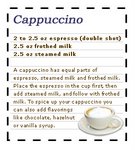Some of us just can't get through a morning or even a day without caffeine! A good many studies have been done about caffeine but the results and conclusions tend to vary, contradict or change as technology evolves. We had a hard time figuring out what to believe. So Whole Latte Love decided to do some good old investigative research on the subject of coffee and caffeine.
Do I need a 12-step program to kick coffee? Caffeine is known in the medical world as trimethylxanthine. It can be used medically as a cardiac stimulant or as a diuretic. Some studies seem to say that caffeine acts like drugs such as amphetamines, cocaine or nicotine. These studies suggest that caffeine affects the part of the brain that triggers functional activity in the shell of the nucleus accumbens (the part of the brain responsible for addiction). This seems to be old news. Recently French researchers have discovered that caffeine does not affect the area of the brain that involves addiction at doses of one to three cups a day. It will increase alertness, but minus the addictive dependence.
What’s in my cup? The amount of caffeine that is in your coffee depends on many variables. Drip coffee has about 100mg of caffeine in a six-ounce cup. A double shot of espresso has about 50mg of caffeine. You thought espresso was stronger, huh? There are two main reasons for this surprising fact. In the coffee world there are two important coffee plants: Robusta (Coffea canephora) and Arabica (Coffea Arabica). Robusta coffee has historically been less expensive to grow and contains the highest caffeine content. Roasting masters of old have developed closely guarded blends of Arabica over hundreds of years. Coffee connoisseurs consider Arabica the better bean for a superior coffee. Espresso blends primarily use Arabica. However some roast masters will blend in some Robusta as a crema enhancer. Espresso is also pressured brewed with just a small amount of water per shot. Drip coffee uses the less expensive Robusta coffee, which accounts for part of its higher caffeine content. It is also exposed to a large amount of water dripping through a screen or filter. In general, the more water used for brewing, the more caffeine the drink will contain.
Is coffee actually good for me? The University of Bristol studied research on caffeine’s influence on cognition and mood. Good news! Coffee helps in the performance of tasks that require sustained attention. Even at normal times when alertness may be hindered, such as after lunch or when a person has a cold.
Will I fall over and die because I drink coffee? For a period of time it was thought that caffeine contributed to heart disease, high blood pressure, miscarriage, and many other medical problems. Recently with more rigorous testing and better methods The American Medical Association stated, “Moderate tea or coffee drinkers probably need have no concern for their health relative to their caffeine consumption provided other lifestyle habits (diet, alcohol consumption) are moderate, as well.” Out of all the studies done there has been no evidence that serious health problems come as a result of drinking coffee or having caffeine in your diet. It is recommended that your caffeine intake is no more than 300mg per day. That’s about three cups of drip-brewed coffee per day. So, drink up!
Wednesday, February 21, 2007
Subscribe to:
Post Comments (Atom)











No comments:
Post a Comment